Vaccin contre le Covid-19, la lanceuse d’alerte vaudoise Yasmine Motarjemi écrit à Bill Gates.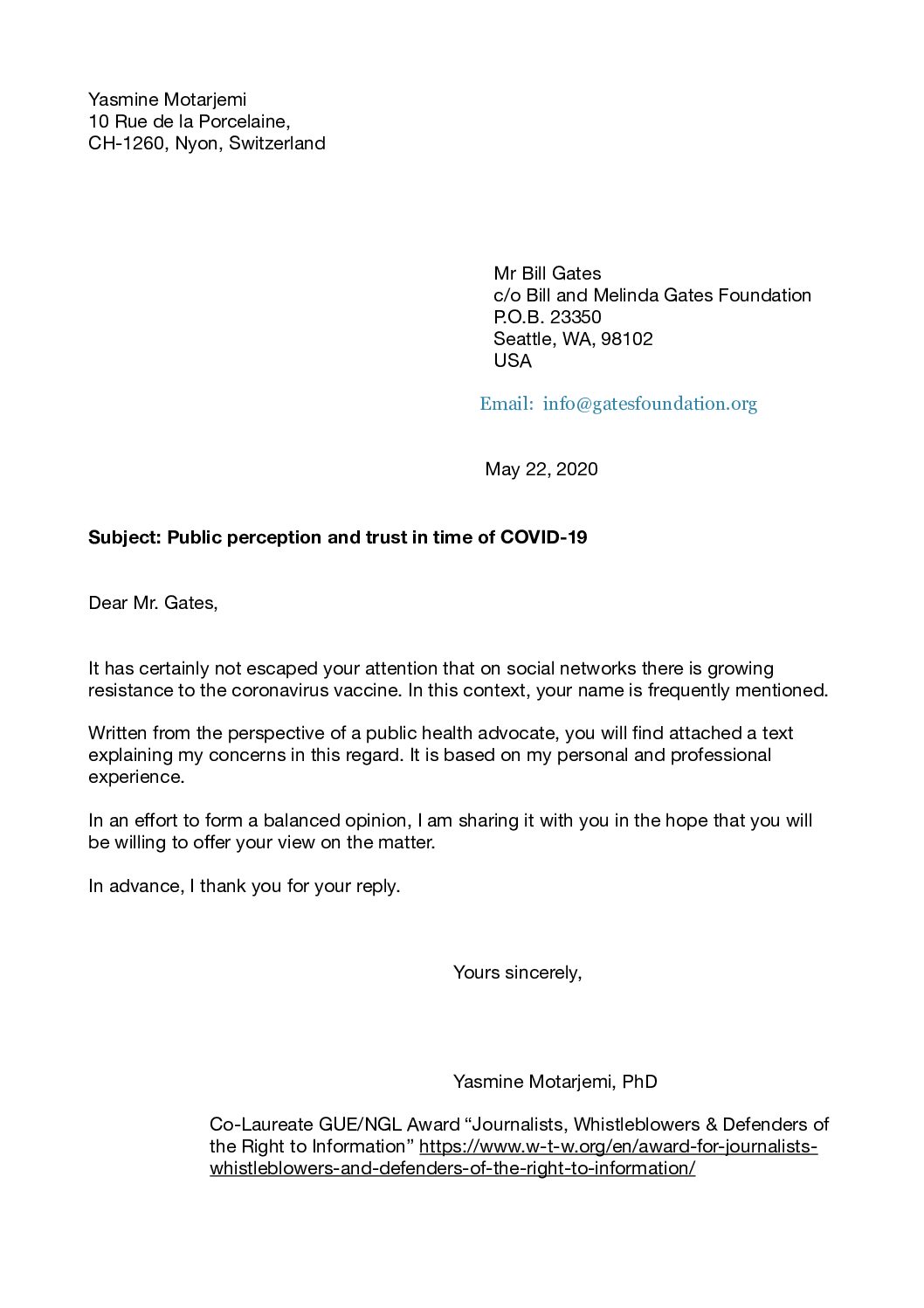
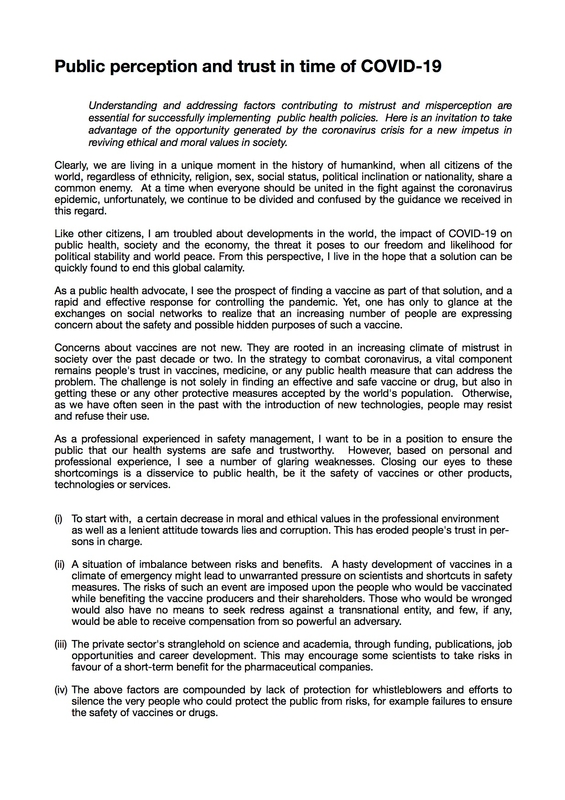
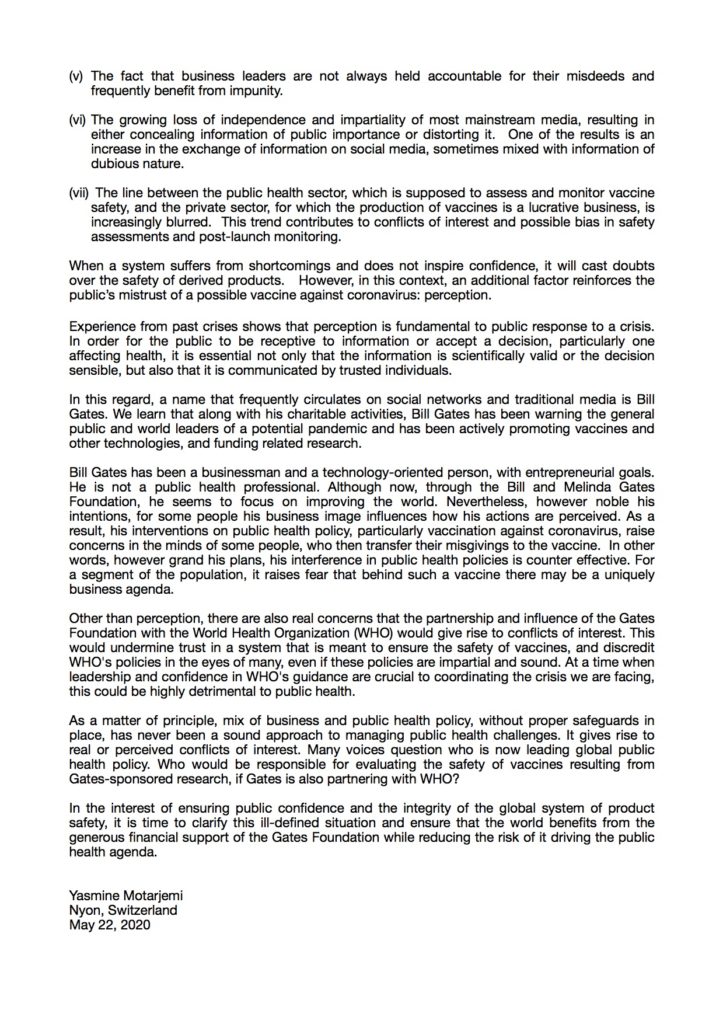 @Yasmine Motarjemi
@Yasmine Motarjemi
How Is The Development Of The Cobid 19 Vaccine Progressing?



 @Yasmine Motarjemi
@Yasmine Motarjemi
Why does the Philippines attract financial fraud? Wirecard is only latest example of Manila being caught up in corporate misdeeds.
reports:
Dr. Stephen Cutler is a security analyst and anti-money laundering consultant in the Philippines who previously served in the FBI.
What is it about the Philippines that seems to attract financial fraud?
Funds stolen from Bangladesh’s central bank were routed to a Philippine bank in 2016, from where they were laundered into the gambling industry. Westpac Banking was accused last December by Australia’s financial crime watchdog of money-laundering breaches, which included payments to suspected child exploiters in the Philippines.
And in late June, it was confirmed that Wirecard, the German payments technology company, had been involved in a fraud where apparent business partners in the Philippines did not exist, along with 1.9 billion euros ($2.1 billion) supposedly held in two Philippine banks.
Allegations of spurious documents, fraudulent transactions and the involvement of junior employees of major Philippine banks call into question not just how these banks supervise internal matters but larger issues of weaknesses in the country’s oversight of its financial system.
What these cases point to is a lack of enforcement capacity on the part of the Philippines’ Securities and Exchange Commission; the Bangko Sentral ng Pilipinas, its central bank; and the Anti-Money Laundering Council, or AMLC.
While these agencies have many good and diligent employees, what appear to be lacking are the ability and willingness of these three bodies to conduct meaningful routine monitoring and verification of financial institutions. This should be aimed at ensuring real compliance with best practices and the legal requirements of due diligence and know your customer policies, beyond going through the motions for audits.
Senior managers at banks have admitted that accounts with them are often opened with “show money,” allowing businesses to obtain SEC documentation, after which the accounts are closed. The accounts are intended to assure investors that money is available to protect them, but closing the accounts, giving no notice to the SEC, leads to shell companies. The SEC has limited staff and cannot conduct reviews of documentation to ensure all remains in order.
The BSP and AMLC both also lack the staffing that would allow meaningful investigations and follow-ups of suspicious activity and even of legally required suspicious transaction reports. The sieve intended to catch bad actors and protect the nation has too many holes. That needs to change.
Reporting on Wirecard shows that a whistleblower raised serious issues on the handling of transactions and accounting issues to senior management. But in the Philippines, there is little to no encouragement for any whistleblower to come forward with serious allegations.
There is, in theory, a witness protection program from the Philippine Department of Justice. But it has a poor reputation for actually protecting anyone. Part of the problem is that it can only move people within the Philippines, not to a faraway place where they can rebuild their lives.
Recently, the government advised the public that it could report misbehaving or corrupt public officials through the 8888 citizens’ complaint hotline — but this does not apply to criminal behavior in private corporations.
The Philippines must take steps to upgrade its ability and, even more so, the perceptions of its willingness to protect witnesses. The Philippines needs to develop a strong whistleblower system, allowing employees to safely and securely report errant behavior by senior management. The BSP, SEC and AMLC should establish protected mechanisms for such reports, with meaningful follow-up investigation on allegations.
Incidents involving the Philippines may well be greeted with “here we go again” and a sigh of disappointment bordering on disbelief. The Philippine financial system must take greater action as an industry to reduce reputational risk and strengthen its standing in international circles. This will start with boards and senior management making public and credible statements in support of transparency and global state of the art banking practices.
The Wirecard allegations should spur serious work by Philippine banks and their regulator to bolster the nation’s reputation in financial services. 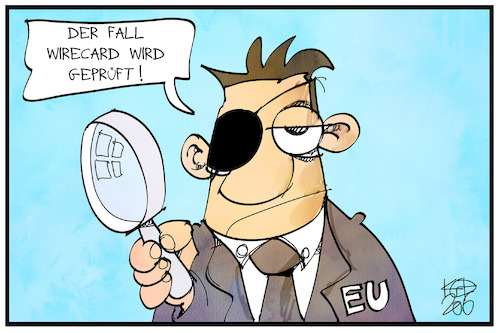
@Kostas Koufogiorgos
FATF Report to the G20 Finance Ministers and Central Bank Governors on so-called stablecoins1 have the potential to spur financial innovation and efficiency and improve financial inclusion. While so-called stablecoins have so far only been adopted on a small-scale, new proposals have the potential to be mass-adopted on a global scale, particularly where they are sponsored by large technology, telecommunications or financial firms. In the same way as any other large scale value transfer system, this propensity for mass-adoption makes them more vulnerable to be used by criminals and terrorists to launder their proceeds of crime and finance their terrorist activities, thus significantly increasing their risk of criminal abuse for money laundering and terrorist financing (ML/TF) purposes improve financial inclusion.
While so-called stablecoins have so far only been adopted on a small-scale, new proposals have the potential to be mass-adopted on a global scale, particularly where they are sponsored by large technology, telecommunications or financial firms. In the same way as any other large scale value transfer system, this propensity for mass-adoption makes them more vulnerable to be used by criminals and terrorists to launder their proceeds of crime and finance their terrorist activities, thus significantly increasing their risk of criminal abuse for money laundering and terrorist financing (ML/TF) purposes…
Virtual-Assets-FATF-Report-G20-So-Called-Stablecoins

Epstein & Friends: Managing PEPs and Your Exposure to Risk.
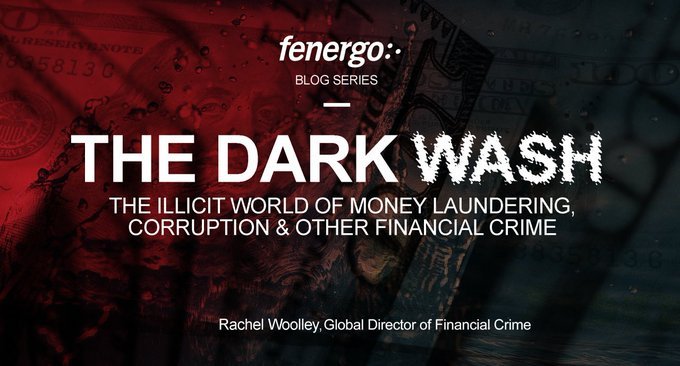 Rachel Woolley reports: What is a PEP, and why should financial institutions be vigilant when assessing the risk of doing business with one? What if someone is not a PEP, but an individual that happens to be associated with one through family, business or other close personal connections? Is Kanye West now a PEP?
Rachel Woolley reports: What is a PEP, and why should financial institutions be vigilant when assessing the risk of doing business with one? What if someone is not a PEP, but an individual that happens to be associated with one through family, business or other close personal connections? Is Kanye West now a PEP?
The definition of a politically exposed person (“PEP”) varies slightly from jurisdiction to jurisdiction but is generally accepted to include individuals that hold a “prominent public function”, including presidents, prime ministers, and other senior politicians. The definition also extends to members of royal families, senior executives of state-owned entities and heads of international organisations, such as the UN, WHO, IMF and the World Bank. Most jurisdictions consider individuals with the ability to direct and control government funds, or the ability to influence decisions, to be politically exposed, and thus could be susceptible to external influence, bribery, or corruption.
It is important to note that identifying an individual as a PEP is not a suggestion of previous or future criminal behaviour. However, it is necessary for financial institutions to adequately identify those individuals that not only hold prominent public functions, but also those that are considered to be closely connected to senior politicians, like family members and business associates, i.e. “known close associates”. The purpose of determining if an individual is a PEP or not is so additional scrutiny can be applied to the financial activity of such individuals. The source of wealth and source of funds of a PEP must be identified, both of which help to paint a picture as to the expected activity of that PEP throughout the relationship with the financial institution. Ongoing activity must also be assessed in order to identify any transactions that may be related to bribery or corruption.
But what about friends? Shouldn’t financial institutions also be concerned about individuals who have close personal connections to influential politicians? The nature of such relationships is important to consider. It is not a crime to be friends with a PEP of course, but questions should be asked about any linked financial transactions or mutual business interests. Close relationships between world leaders should also be considered, particularly where one stands to benefit from the success of another. Financial institutions should be alert to the potential for financial activity relating to such individuals, especially through any associated individuals or companies.
Political connections aside, wealthy individuals with prominent business interests are categorised as high net worth individuals (“HNWI”) and their financial activity should also be subject to increased scrutiny as a result. This is especially relevant when you consider that such individuals may stand to benefit if political decisions are made in their favour or interest, and whether or not any financial activity has occurred that may have influenced such decisions. It is also likely that such individuals mix in the same social circles as high-ranking officials, some of whom are wealthy individuals with prominent business interests in their own right. So, isn’t it important to identify and scrutinise these connections carefully?
I’m sure you’ll have seen many photographs of senior politicians alongside well-known public figures, including celebrities. You may also have seen photographs that have been widely circulated on social media of Jeffrey Epstein alongside many senior political figures. Questions have been asked as to the nature of such relationships, financial, political, or otherwise. If you haven’t yet seen the documentary, “Jeffrey Epstein: Filthy Rich”, then it’s worth watching. Consider the nature of the relationships that Epstein had with political figures, and whether his financial support or other inducements could have been used to unduly influence decisions to his benefit.
Another must-watch is Ava DuVernay’s 13th, which examines racial inequality in the United States. The documentary also looks at the influence powerful corporations have on legislation intended to bolster corporate profits while negatively impacting other members of society, often with devastating long-term consequences.
And if you have already completed Netflix then consider watching Hamilton, now streaming on Disney+. Keep an eye/ear out for the part relating to one of the first sex scandals in American political history, the Hamilton-Reynolds affair in 1791. James Reynolds extorted Alexander Hamilton, the first Secretary of the Treasury in the US, who was involved in an affair with Reynolds’ wife. Hamilton was ultimately confronted about possible corruption, answering questions as to whether or not the financial payments were in fact misappropriated government funds.
Like all things financial crime related, context is important. As a reminder, being a PEP is not a crime, but it is critical that financial institutions are alert to potential criminal financial activity when doing business with one. Knowing how to identify a PEP or identify individuals that have close associations with one is a crucial element of financial crime prevention. Understanding the nature of relationships and expected financial activity helps to identify activity that may be illicit. Consider individuals in positions of influence or power, particularly those with the ability to direct or control government funds. Also consider individuals with close personal connections. Is it reasonable to invite casual acquaintances to visit your private island, for example? About as reasonable as a celebrity running for the highest office in the land. 
@afranco
While wildlife are the most common source of emerging human disease, domesticated animals may be original sources, transmission pathways, or amplifiers of zoonotic disease. Such linkages – as well as the interconnectedness with issues such as air and water quality, food security and nutrition, and mental and physical health – should inform policies that address the challenges posed by current and future emerging infectious diseases, including zoonoses….Key message
In this time of crisis, thousands of papers and guidelines have already been published about COVID-19. Most of these consider the important questions of how to respond to the ongoing public health crisis, or how to mitigate the impacts of the pandemic. This report takes a step back and considers the root causes of the emergence and spread of the novel coronavirus and other ‘zoonoses’—diseases that are transmitted between animals and humans. The report also offers a set of practical recommendations that can help policymakers prevent and respond to future disease outbreaks.
UNEP Executive Director Inger Andersen and ILRI Director General Jimmy Smith launched the report at a press briefing in New York City on 6 July 2020. Watch session here. Zoonotic diseases and how to break the chain of transmission
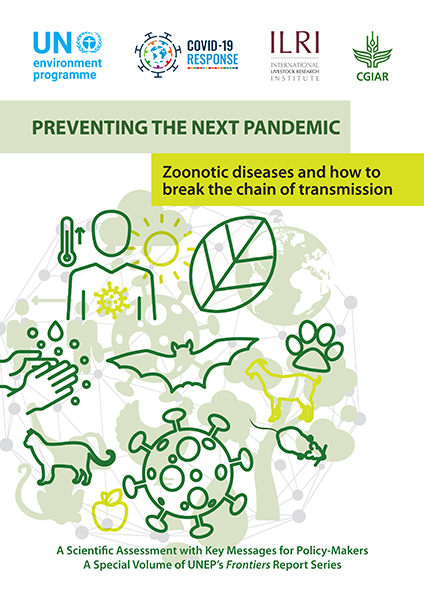
Unravelled International Coordination Led By Eurojust.
In an operation in Hungary, Austria, the Czech Republic, Slovakia and Serbia, coordinated by Eurojust and supported by Europol, Hungarian authorities have arrested two leaders of an organised crime group responsible for massive VAT fraud with the sale of sugar and cooking oil imported from EU member states. In all, 33 locations in 5 countries were searched to unravel a two-year long scam to avoid payment of value added tax to the Hungarian authorities, which missed out on approximately EUR 10 million in income. The operation had no impact on the end users of the sugar and cooking oil.
The criminal network, which operated mainly in Hungary, imported huge quantities of sugar and cooking oil from the European Union through domestic companies. The products were resold to Hungarian wholesalers; however, the VAT incurred was not paid. As part of their VAT carousel fraud, they declared the EU purchases as domestic, which enabled them to significantly reduce the VAT payable. Moreover, these products were purchased at a net price with a minimum margin, so that an unfair advantage was gained over market competitors. Approximately EUR 10 million was lost to the Hungarian budget through avoidance of the VAT payment.
Given the cross-border dimension of the criminal activity and the need to coordinate the multiple judicial requests with judicial and executing law enforcement authorities from other countries, the case was referred to Eurojust.
Eurojust supported the Hungarian judicial authority with the execution of European Investigation Orders and other judicial instruments for the other countries involved, a result of which numerous witness hearings and house searches and document seizures were made outside Hungary.
On 23 June, Eurojust set up a coordination centre in cooperation with Europol. During the action day, eleven simultaneous searches and twelve witness hearings took place in Austria, the Czech Republic, Slovakia and Serbia, in addition to 22 house searches in Hungary. Altogether, nine suspects were interrogated, of which two were arrested and one real estate was seized. Over 110 officers were deployed in the operations on the ground.
In the run-up to the action day, Eurojust facilitated direct contact between the national judicial and law enforcement authorities from all 5 countries involved, helping to map out the criminal activity, providing translations and hands-on operational support.
In Hungary, the National Tax and Customs Administration, together with the relevant judicial and police authorities, took the lead in resolving the case.
In Slovakia, the Regional Prosecutor´s Office of Banská Bystrica coordinated the EIO execution, while the investigative measures requested were carried out by the regional Police.
Additional support was provided in the Czech Republic by the Regional Public Prosecutor´s Office in Brno and the Regional Directorate of the Police in South Moravia.
In Austria, several public prosecutor’s offices, police and fiscal authorities were involved in the case.
In Serbia, the Higher Prosecutors’ Office in Novi Sad and the Ministry of Interior, Crime Investigations Directorate, Anti-Corruption Department, helped to execute the Mutual Legal Assistance request.
VAT-fraud with sale of sugar and cooking oil in Hungary unravelled
Eurojust supports action against tax fraud in Hungary
Credit to OCCRP: Compounding the issue, the country’s public procurement law was quietly changed in the middle of the crisis to ensure still greater secrecy.
On the very day the first COVID-19 cases were identified in the country in mid-March, the Ministry of Finance published a press release calling on “every caring citizen of the Kyrgyz Republic who sincerely wants to contribute” to donate money for the fight against the virus.
To ensure transparency, the government launched a website that would supposedly allow citizens to monitor the total amount of cash received, who it was from, and how it would be spent. It even set up a commission to distribute the funds.
“Several government bodies are members of the commission. I have no doubts about transparency,” said Amangeldi Isayev, deputy head of the ministry of agriculture and a member of the commission.
But the member of the commission from the NGO sector, Galina Chirkina, disagrees. She said that even members of the commission have not yet received all the details on how the money was spent, but the ministry of health promised to do so at the end of June.
“There is no transparency,” she said. “The government does nothing to provide transparency, nothing.”
Because the money was collected from the public, and is not technically from the government budget, there is also no oversight, she said.
“If it was state money, there is the financial police that checks the intended use. For the [donated money], only we can verify it because the financial police absolutely doesn’t care,” she said.
In practice, the information on the site is so general that it is impossible to understand what the money was actually spent on.
A total of almost $2.2 million has been collected so far, mainly from state employees who donated one day’s salary, as well as individuals, government bodies, and local businesses.
Most of the donations, over $1.8 million, were transferred to a new account in the Ministry of Health and almost all of that money was spent to pay medical workers as compensation for the risk of being infected. But the site does not reveal the names of those who were paid or any justification for their varying amounts of compensation. Moreover, some medical workers have complained that they were underpaid and that compensation was distributed unfairly.
An additional $294,000 was spent on groceries for people who needed assistance during the country’s lockdown, although it is not clear how many people received them. The rest of the money has not yet been allocated.
Citizen donations represent only a small fraction of the total amount the government plans to spend to combat the pandemic, however. It has allocated another $15.7 million for COVID-19 expenses from the state budget and received $250 million from international organizations in both grants and loans. Another $377 million are expected. But there is little information publicly available about how this money has been or will be spent, and the Ministry of Finance has not yet provided all the details to reporters.
Government spokesperson Chyngyz Esengul uulu declined to comment on why the government doesn’t reveal detailed information on spending and suggested the question be referred to the institutions, such as the ministry of health and ministry of finance, that actually spend the money.
The press secretary of the Ministry of Finance, Samat Toyaliyev, called the question “interesting” and explained that he also asked for detailed information but was told that it could not be given because of a lack of resources.
“I asked the employees of the Central Treasury, they said: ‘to figure it out, one employee has to sit for at least two weeks or a month’ … I was told that it is hard to figure it out,” he said.
When he was approached by a journalist again, he dodged the question and proposed that the reporter come and work as the head of the ministry’s press department….occrp.org
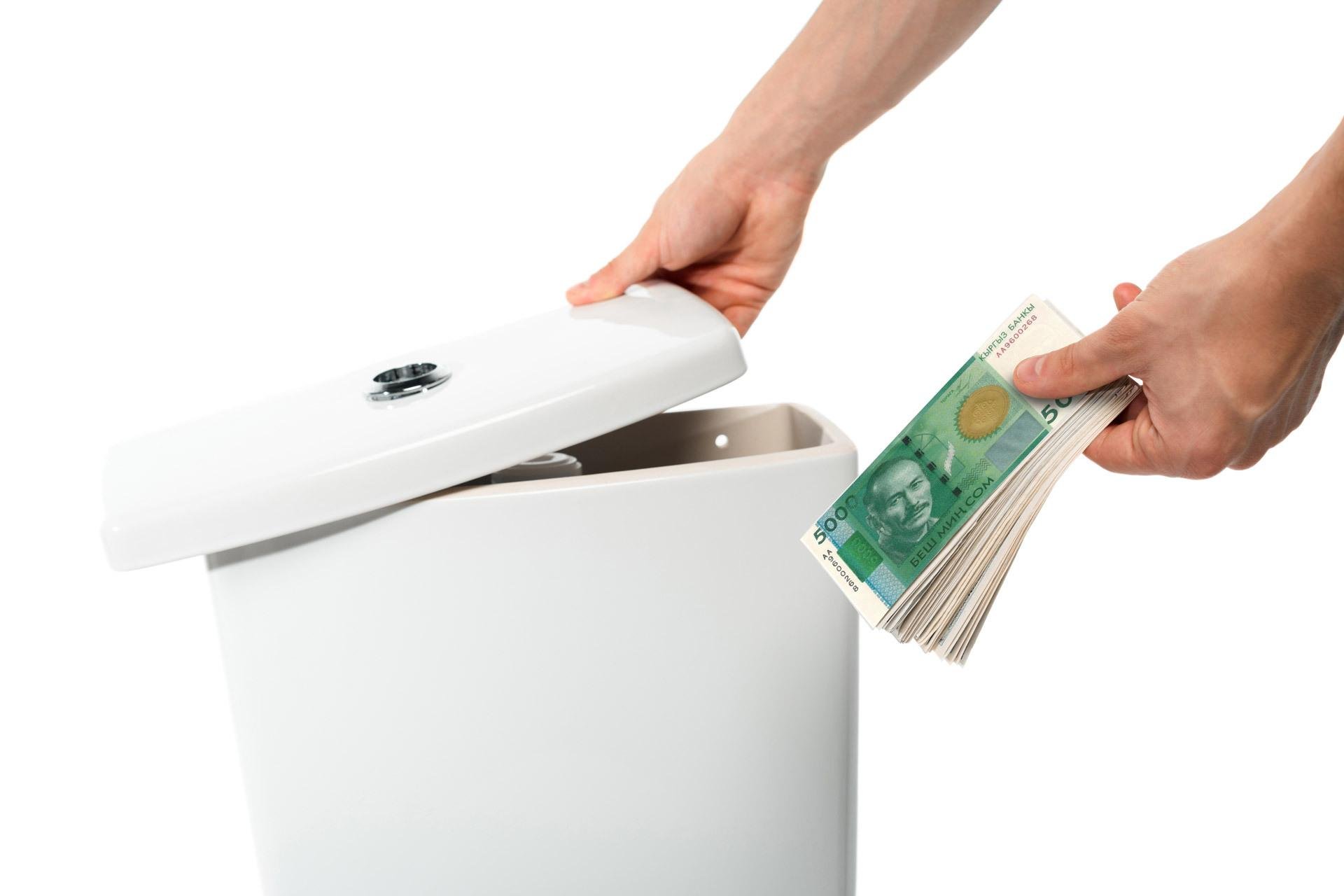
Credit- Edin Pasovic
Women in government are important for their point of view, their priorities, and the protection of children and families. The United States is a laggard in promoting women in the political sphere.
Richard Reeves writes for the Brookings Institution:
Acentury on from women winning the right to vote in the U.S., our nation has made huge progress on many fronts. But plenty more is needed—and above all in the political sphere. The U.S. compares badly to most other countries in the world in terms of gender equality in politics—including to our nearest neighbors, Canada and Mexico.
The 2020 Global Gender Gap Report from the World Economic Forumranks progress toward equality in 153 countries around the world. The U.S. is in a disappointing 53rd place, compared to 25th place for Mexico and 19th place for Canada. WEF calculates gender equality in each country based on four equally weighted domains: educational attainment, health and survival, economic participation and opportunity, and political empowerment. WEF calculates the degree of gender equality in each domain, drawing on a range on indicators for each, where each indicator ranges from 0 to 1, with 1 indicating parity.
Here is how the U.S. compares overall and on each on these dimensions to Canada and Mexico:
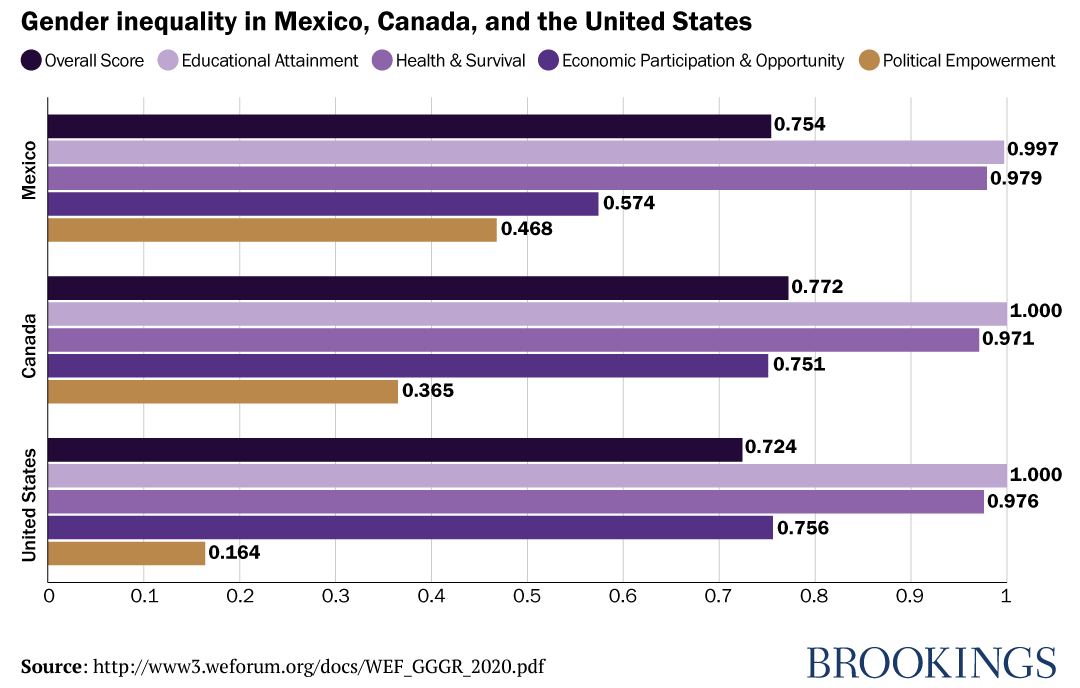
All three countries have achieved gender equality, or very close to equality, in education and health. (In fact, gender inequalities especially in education now go the other way, which does not influence the WEF scoring system). The U.S. and Canada score similarly, and much higher than Mexico, in terms of economic equality. But in terms of political empowerment, Mexico leads the three, followed by Canada, with the U.S. trailing well behind.
Gender equality in the political domain is calculated by WEF using three indicators: the ratio of women to men in terms of years in executive office (prime minister or president) over the last 50 years; the current ratio of women to men in parliamentary positions; and the current ratio of women to men in ministerial positions.
All three North American nations score poorly on the first indicator. Neither Mexico nor the U.S. has had a female political leader, and Canada was led by a woman for just six months (Avril Campbell in 1993). In the U.S., 2016 was the first year when voters even had the chance to vote for a female presidential candidate from one of the major parties.
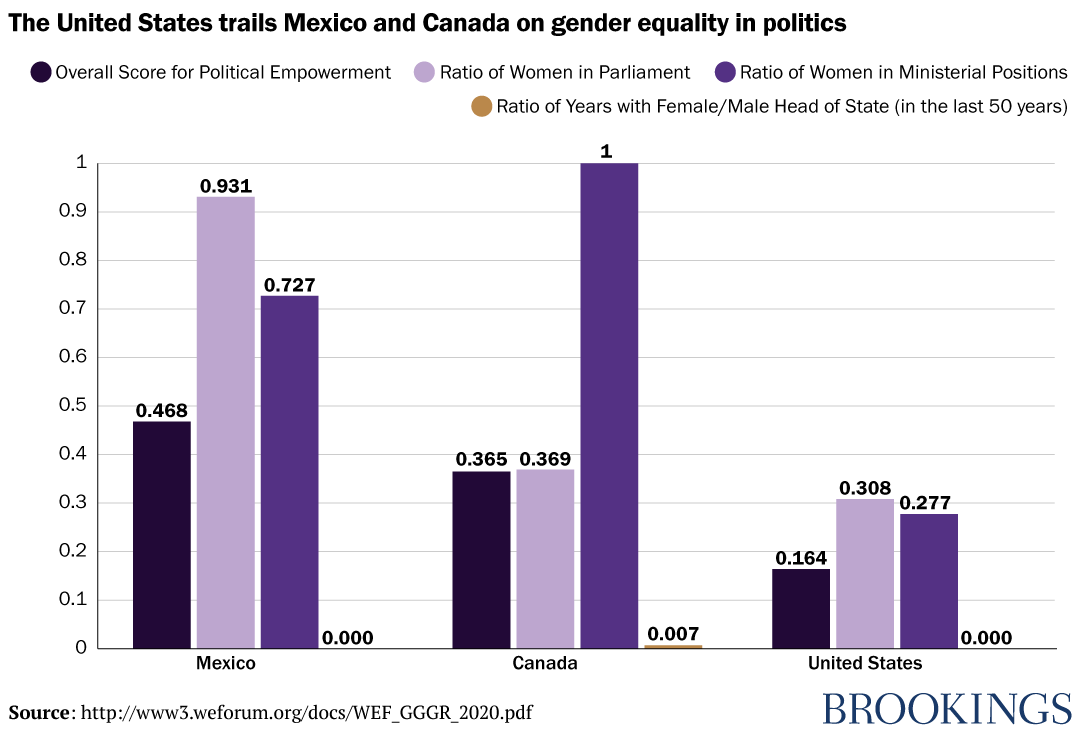
But as the figure shows, parliamentary representation in Mexico is now essentially equal, and ministerial representation is close behind, at 42 percent female. Both Canada and the U.S. do much less well than Mexico on the parliamentary measure, with women accounting for just one in four legislators. But Canada now excels in terms of ministerial representation, with Justin Trudeau making good on his electoral promise to choose a gender-equal cabinet.
Scoring poorly on all three metrics, the U.S. falls into the bottom half of the global league table for gender equality in the political sphere, trailing behind, for example, the Philippines, India, South Korea, and the United Arab Emirates.
By my calculations, if the U.S. matched Mexico’s political empowerment score, it would jump from 53rd to 6th place in the world for gender equality (with an overall equality score of 0.80), beating out New Zealand, Denmark and Canada. For the U.S., politics is the biggest challenge—but also therefore potentially the biggest opportunity.
Improving the representation of women in Congress is a clear imperative. The last three decades have seen rapid gains on this front:
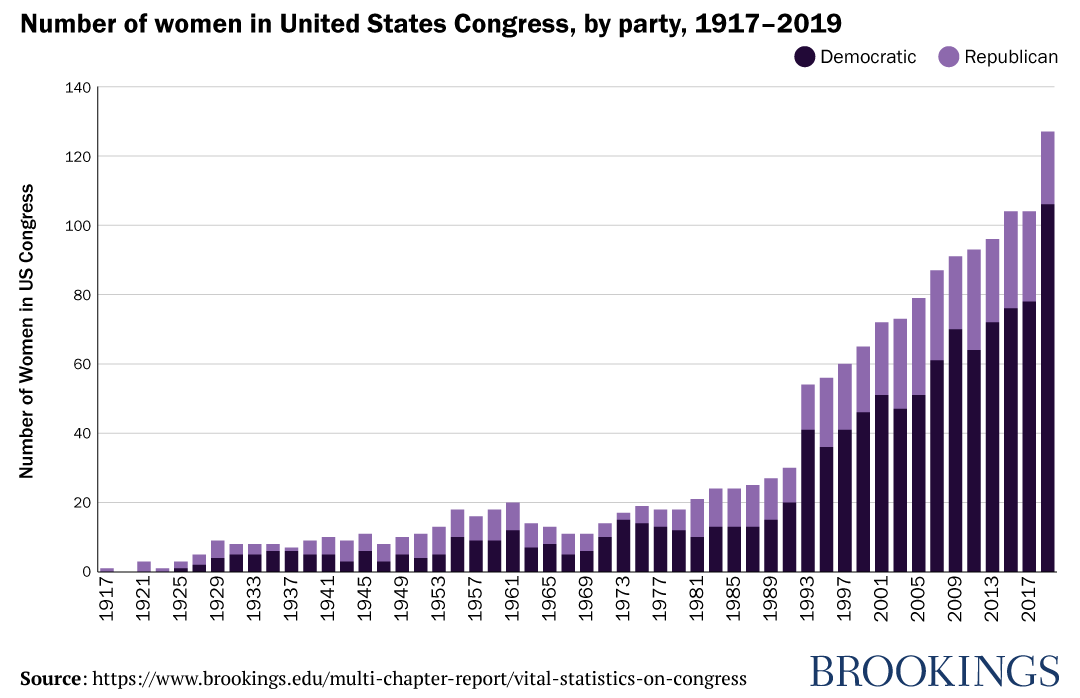
But even now there are still three men for every woman in the U.S. Congress. It is also notable that the increase is skewed heavily to the Democrat side of the aisle, where the proportion of women has increased from 3.7 percent in 1991 to 19.8 percent in 2019, compared to a rise from 1.9 percent to 3.9 percent for Republicans. If the Republican Party had similarly increased the proportion of Senators and members of the House during this time, overall female representation would now be at 30 percent, rather than 24 percent, and would lift the U.S. from 53rd place to 43rd place on the global league table.
A step-change in female representation is needed to get close to equality within any reasonable timetable. But how? Mexico’s progress is the result of intentional policy changes. Since 2014, the Mexican constitution has required gender parity among candidates from all political parties for positions in the federal Chamber of Deputies and Senate (as well as and state congresses). The resulting transformation in representation is proof that “quota laws work,” according to Sofia Alessandra Ramirez from the Council on Foreign Relations.In fact, more than half the countries in the world now use some form of quota system to increase female representation. There is no evidence of a drop in the quality of candidates or legislators. If anything, quotas seem to improve the skills of leaders by, as one Swedish study brutally put it, reducing the number of “mediocre men.”
Quotas in politics are a great idea, but even if such a law could be passed in the U.S. it would be struck down as unconstitutional by the Supreme Court. Nothing, however, is to stop the major political parties from adopting such quotas themselves—like parties in many other countries. Anisa Somani suggests that some public funding of political parties could be tied to the adoption of such quotas, an excellent proposal.
Replacing the current “winner takes all” voting system with more representative approaches such as ranked choice voting or multi-winner districts would also result in greater female representation, among many other reasons for their adoption.
The fastest way to improve the U.S. ranking would be to for either President Trump or President Biden to follow Trudeau’s lead and appoint a balanced cabinet. Overnight, the global standing of the U.S. in terms of gender equality would be dramatically improved. Another area where progress is needed (and has gone backwards since 2016) is in the proportion of women in advisory positions, as Kathryn Dunn Tenpas argues in her essay in this series.
But the biggest prize of all, of course, is the White House. Although WEF gives each of the four main domains—economics, health, education, and politics—an equal weight, the sub-indicators for each are weighted differently. For the political empowerment score, most weight goes to the head-of-state indicator. And here of course the U.S. gets the lowest score possible: zero. By comparison, many countries closer to the top of the gender equality table have had women as political leaders for many of the last fifty years, including Iceland (22 years), Norway (16 years), Germany (14 years), and the United Kingdom (14 years).
Simply electing a woman as president would therefore transform the position of the U.S. on the international league table for gender equality. By my calculations, if Hillary Clinton had become a two-term president in 2009, the U.S. would be 36th in the world—not high enough perhaps, but a lot higher than 53rd.
The World Economic Forum is not the only game in town: there are many other indices of gender equality, including internationally-focused ones produced by the European Institute for Gender Equality the United Nations and the OECD. Each have their strengths and weaknesses, and each rest on different assumptions about what matters most and how progress should be quantified. Some include measures of time use, rates of domestic violence, tax treatment, civil liberties, and so on. Some focus more on absolute measures, while other highlight the relative position of women and men.
As a general proposition, countries that are more economically developed are typically closer to gender equality. In many of these countries, women have overtaken men on some fronts, such as education, while still at a disadvantage in many other areas, such as politics.
Fifty years before the U.S. granted women the vote, John Stuart Mill argued in The Subjection of Women for “a principle of perfect equality.” He considered that “the most vitally important political & social question of the future, [is] that of the equality between men and women.”
But how will we know when “perfect equality” has been achieved, when the “subjection” of women has ended? Mill, like most of his contemporaries, was focused on achieving equality for women in law, and especially with the right to vote. Like his intellectual partner and wife. Harriet Taylor Mill, he hoped that women’s suffrage would pave the way to equality in other walks of life.
By and large this was an accurate prediction. Getting the vote was indeed a vital first step to getting many other social, legal and political rights for women. But even now, “perfect equality” has not been achieved—and in the U.S., especially in the sphere of politics itself.
The fight for equality began with politics, and specifically with the right to vote. After ten decades of significant social, cultural, and economic progress, the biggest challenge is once again in the political arena. Now, the need is for much greater representation of women in politics—including in the highest office in the land.
and its Link to other serioue crimes. Focus on Poly-Criminality.
Europol reports: The aim of this report is to inform law enforcement officials and policy makers about the various ways in which IP crime is linked to other forms of criminal activity. The report is in the form of a case book, presenting case examples where IP crime is linked to other forms of criminality.
IP CRIME AND ITS LINK TO OTHER SERIOUS CRIMES Focus on Poly-Criminality
europol-euipo_polycriminality_report
For the past 20 years, Putin has been driven principally by his desire to maintain power. To this end, he has weakened the state, eliminated competition, and personalized Russia’s political system. While an older generation of Russians credit Putin for helping Russia overcome the turmoil of the 1990s, in reality he has turned the country into a kleptocracy that does not work for ordinary Russians. As he has grown more paranoid about threats to his power—internal and external, real and imagined—Putin has suppressed the freedoms of Russians, increasingly through an arsenal of digital tactics.
As he has grown more paranoid about threats to his power—internal and external, real and imagined—Putin has suppressed the freedoms of Russians, increasingly through an arsenal of digital tactics.
Despite Russia’s internal weaknesses, Putin has boosted the country’s global standing. The lack of constraints on his power, his investment in modernizing his military, and his ability to exploit asymmetries of interest between Russia and the West have allowed Putin to seize opportunities, even those that violate international laws. Today, Russia has a role in most global issues of consequence. But Putin also understands the limits of Russian influence. He has therefore sought to undermine Western democracies to improve Russia’s relative standing. His tactics and strongman brand have created a model that anti-democratic leaders emulate. As Putin has alienated Russia from the West, Russia’s place in the world is increasingly alongside the regimes of Bashar al-Assad, Hassan Rouhani, Nicolás Maduro, and Xi Jinping. Much can be told from the company one keeps.